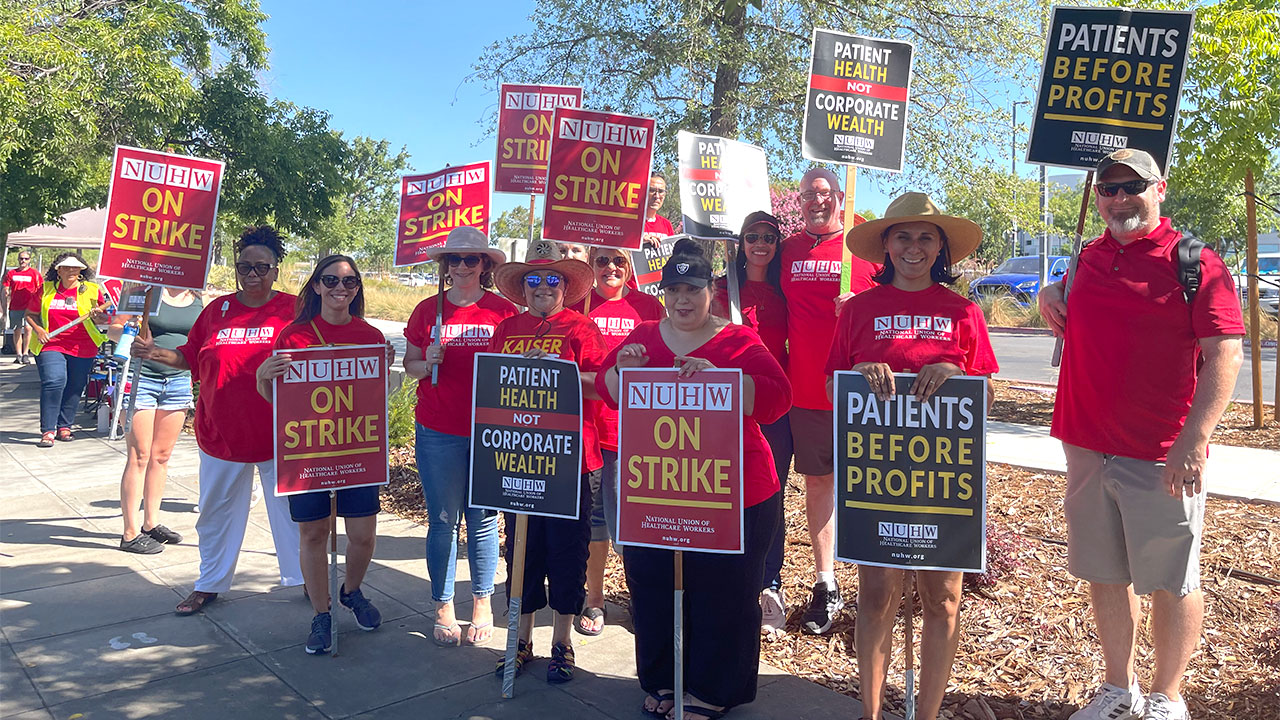LISTEN TO THIS ARTICLE:
Update: One year ago 2,000 mental healthcare providers went on strike. Their company, Kaiser Permanente, is now, in 2023, at the center of the biggest ever healthcare strike in U.S. history. About 75,000 nurses, techs, cnas, and other employees at Kaiser are officially on strike. However, the AMA, which represents doctors, did not join them. The unions are demanding better wages and working conditions. They also want a guarantee from Kaiser to hire thousands more employees to reduce under staffing.
Last week, mental healthcare workers in California went on strike. More than two thousand therapists, psychologists, social workers and substance use counselors are protesting across the state. They allege that Kaiser Permanente, one of America’s largest non-profit HMOs, has put patients at risk. According to The Guardian, “Kaiser has just one mental health clinician for every 2,600 patients” and many mental health services are being delayed. Kaiser has rejected union proposals to “expand the workforce and ‘improv[e] access to care.’”
NPR reports that it takes patients often weeks to get an appointment, even those patients where care is critical such as in suicide attempts or other mental health crises. Crushing caseloads for workers are causing patients extended wait times to access needed services such as therapy, and because of this, many mental healthcare workers have left the company.
More than two thousand therapists, psychologists, social workers and substance use counselors are protesting across the state. They allege that Kaiser Permanente, one of America’s largest non-profit HMOs, has put patients at risk.
It’s the law!
California has recently passed two laws that may help. Sal Rosselli is the president of the National Union of Healthcare Workers, which represents the mental healthcare providers who are on strike at Kaiser Permanente. He noted that one law requires that “every provider to provide a range of medically necessary care. And if they can’t provide it in-house, they have to pay to have it provided externally.” The second law requires patients to be able to see a provider within 10 days of their initial intake.
But Kaiser is not following these laws. According to the mental healthcare workers’ union, Kaiser has “violat[ed] clinical guidelines around treatment and state laws.” This is not the first time the company has run afoul. The company was fined $4 million in 2013 for various problems within the system. These include extended wait times for appointments and providing incorrect educational materials. Currently, there is a state investigation of Kaiser for failing to address the issues within their system.
Not just California
But California is hardly alone. In both Washington and Minnesota, mental healthcare workers have started to strike to protest unsafe working conditions and extended wait times for patients to see therapists and counselors. In 2021, in Tukwila, Washington, workers won their strike after three and a half months. This past May, Minnesota mental healthcare workers staged a one-day strike that helped raised the awareness of several issues within their hospital system.
Needs not being met
While the issues with Kaiser were happening before COVID-19 hit, the pandemic has affected many people’s mental health. According to a study by Panchal, Kamal, Cox, and Garfield “4 in 10 adults in the US have reported symptoms of anxiety or depressive disorder.” Higher numbers of substance use have also been reported throughout the pandemic. These numbers reflect the struggles among essential workers, children and young adults, those who have lost their jobs, and people of color, especially. The mental healthcare system is struggling to keep up with the demand and the hope of the workers on strike is that awareness of the problem will bring changes within the system that will benefit patients and mental health care workers.
If you are struggling with a mental health issue, try our symptom checker and Find a Provider!

 Learn
Learn Read Stories
Read Stories Get News
Get News Find Help
Find Help

 Share
Share
 Share
Share
 Share
Share
 Share
Share



